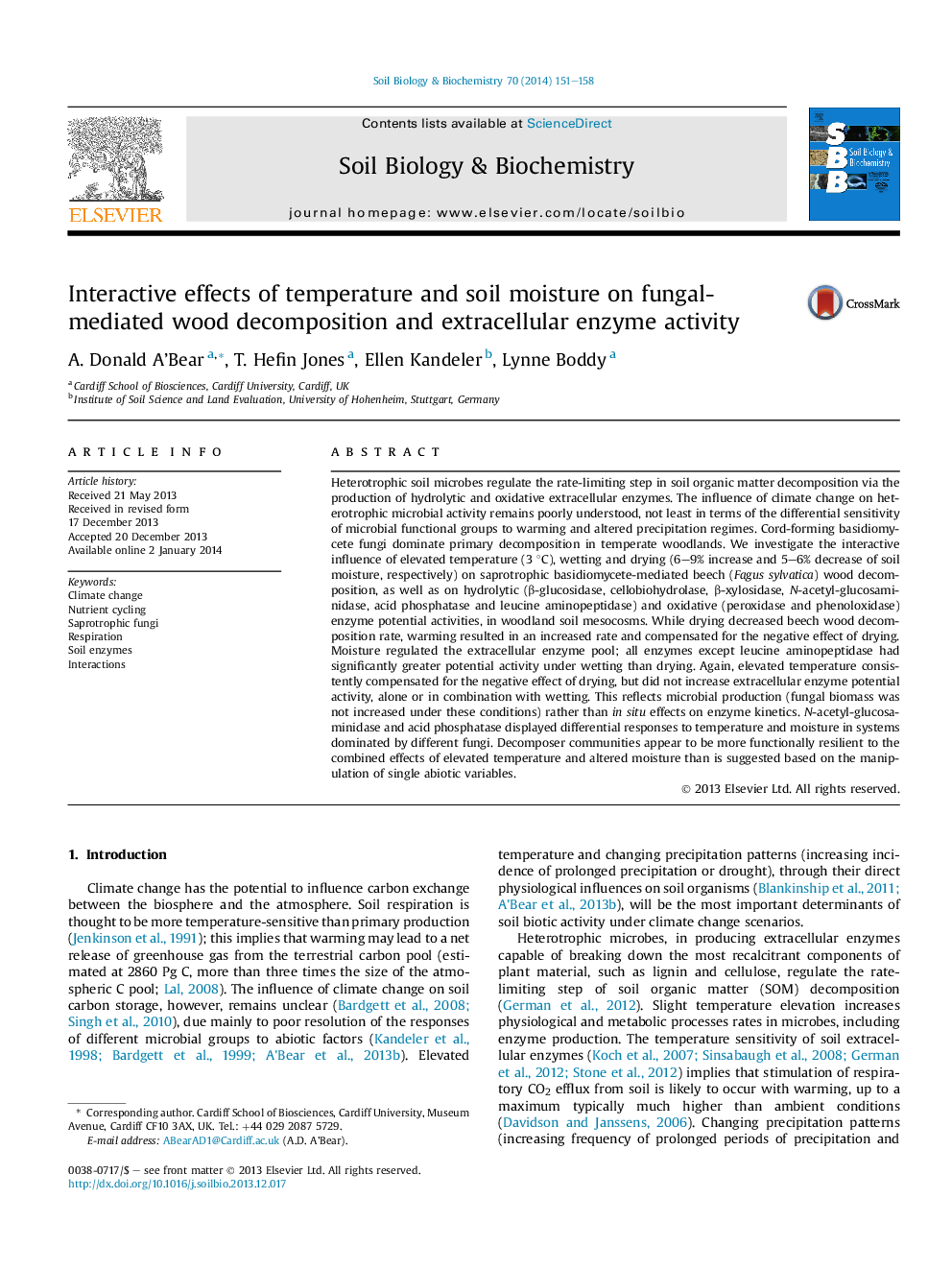| کد مقاله | کد نشریه | سال انتشار | مقاله انگلیسی | نسخه تمام متن |
|---|---|---|---|---|
| 8364942 | 1542614 | 2014 | 8 صفحه PDF | دانلود رایگان |
عنوان انگلیسی مقاله ISI
Interactive effects of temperature and soil moisture on fungal-mediated wood decomposition and extracellular enzyme activity
ترجمه فارسی عنوان
اثرات تعاملی دما و رطوبت خاک بر تجزیه چوب قارچی و فعالیت آنزیم خارج سلولی
دانلود مقاله + سفارش ترجمه
دانلود مقاله ISI انگلیسی
رایگان برای ایرانیان
کلمات کلیدی
موضوعات مرتبط
علوم زیستی و بیوفناوری
علوم کشاورزی و بیولوژیک
دانش خاک شناسی
چکیده انگلیسی
Heterotrophic soil microbes regulate the rate-limiting step in soil organic matter decomposition via the production of hydrolytic and oxidative extracellular enzymes. The influence of climate change on heterotrophic microbial activity remains poorly understood, not least in terms of the differential sensitivity of microbial functional groups to warming and altered precipitation regimes. Cord-forming basidiomycete fungi dominate primary decomposition in temperate woodlands. We investigate the interactive influence of elevated temperature (3 °C), wetting and drying (6-9% increase and 5-6% decrease of soil moisture, respectively) on saprotrophic basidiomycete-mediated beech (Fagus sylvatica) wood decomposition, as well as on hydrolytic (β-glucosidase, cellobiohydrolase, β-xylosidase, N-acetyl-glucosaminidase, acid phosphatase and leucine aminopeptidase) and oxidative (peroxidase and phenoloxidase) enzyme potential activities, in woodland soil mesocosms. While drying decreased beech wood decomposition rate, warming resulted in an increased rate and compensated for the negative effect of drying. Moisture regulated the extracellular enzyme pool; all enzymes except leucine aminopeptidase had significantly greater potential activity under wetting than drying. Again, elevated temperature consistently compensated for the negative effect of drying, but did not increase extracellular enzyme potential activity, alone or in combination with wetting. This reflects microbial production (fungal biomass was not increased under these conditions) rather than in situ effects on enzyme kinetics. N-acetyl-glucosaminidase and acid phosphatase displayed differential responses to temperature and moisture in systems dominated by different fungi. Decomposer communities appear to be more functionally resilient to the combined effects of elevated temperature and altered moisture than is suggested based on the manipulation of single abiotic variables.
ناشر
Database: Elsevier - ScienceDirect (ساینس دایرکت)
Journal: Soil Biology and Biochemistry - Volume 70, March 2014, Pages 151-158
Journal: Soil Biology and Biochemistry - Volume 70, March 2014, Pages 151-158
نویسندگان
A. Donald A'Bear, T. Hefin Jones, Ellen Kandeler, Lynne Boddy,
